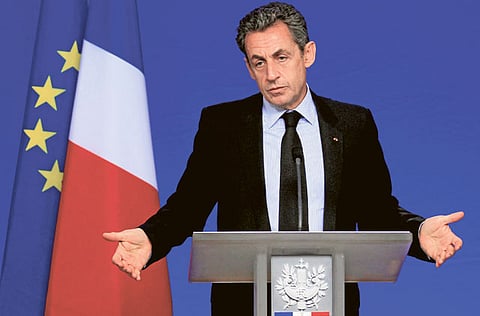Sarkozy confronts himself
The French president's impulsive personality and fascination with celebrity and fortune have deeply antagonised his voters

Like all tragic heroes and most recent French presidents, President Nicolas Sarkozy confronts only one truly dangerous opponent in seeking re-election. Sarkozy's most implacable foe in the balloting that begins in 10 weeks is himself.
"Sarko the American," as he is nicknamed in France, must overcome his early years of failing to govern France effectively amid endless gossip about a very public divorce and glitzy remarriage. Moreover, his impulsive personality and fascination with celebrity and fortune have deeply antagonised French voters, many of whom tell pollsters they will never vote for President Bling-Bling (another local appellation).
Polls show him trailing by double digits his Socialist challenger, Francois Hollande — whose chief promise is to be ‘a normal president.' So Sarkozy now relies on two assets that normally are not decisive in French elections: campaign help from the German chancellor, Angela Merkel, and a record of activism in foreign affairs anchored in significantly improving French-American relations. Politics in Paris today is a case of deja vu all over again, but in reverse.
In 1974, the French urged Americans to overlook former US president Richard Nixon's Watergate misdeeds and to concentrate instead on foreign policy successes such as the opening to China and Middle East peace talks (even though those talks were really the handiwork of the late, lamented and lamentable Anwar Sadat, former Egyptian president). Things came full circle in Paris the other day as I found myself nodding when Foreign Minister Alain Juppe argued that "Sarkozy's strong performance on the international stage should be an asset for him" in the coming campaign. If Americans overlook Sarkozy's lacklustre domestic record, they certainly have reasons to want him reelected. Juppe's list matched mine: Sarkozy's hard-charging interventions in Libya and the Russian-Georgian conflict; his decision to re-invigorate the Nato military command; and his dogged quest for a global response to the financial crisis through the Group of 20 forum.
Political cover
Such leadership came from no other European leader — especially not the super-cautious Merkel, who plays the plodding tortoise to Sarkozy's Bugs Bunny version of a hare. In fact, Bugs may be an appropriate leadership model for these bilious, frenetic times when politicians have to jump from one debilitating, reputation-grinding crisis to another. Temperamental opposites, Merkel and Sarkozy were openly antagonistic after he was elected in 2007. But that was before the Greek debt crisis destabilised the currency their countries share.
They now provide political cover for each other in moving circuitously but steadily toward a level of economic coordination that he wanted yesterday and that she wanted never. They have bought time and prepared markets and governments to wait calmly this week as the Greeks and their creditors grapple with one more short-term bailout plan that they hope will stave off an immediate default and Greece's probable exit from the Eurozone.
Merkel has agreed to visit France and join him in campaigning. He has also triggered my slack-jawed amazement by calling on the French to embrace the German economic model of labour reforms to achieve productivity gains.
"President Sarkozy understood that the only solution was a stronger strategic relationship with Germany," added Bruno Le Maire, Sarkozy's agriculture minister and at 40 a rising star among French conservatives. Le Maire, a strong proponent of a German-French alliance, admitted that he has not yet succeeded in convincing the Sarkozy team to take a second essential step toward re-election.
"We have to recognise that we have made some mistakes, to show a sense of humility," Le Maire said. An apology might overcome the feeling among many voters that Sarkozy has neglected or disrespected them. The president is reluctant to admit specific error, one campaign insider said, for personal and tactical reasons. Sarkozy demonstrated in 2007 that he is a fierce and skilled campaigner. He will pull out all the stops in the initial voting on April 22 that leads to a runoff on May 6. But to win, he will have to make voters forget a flawed performance at home — something Nixon could not pull off almost four decades ago and that has gotten no easier since.
Jim Hoagland is a contributing editor to The Post.



